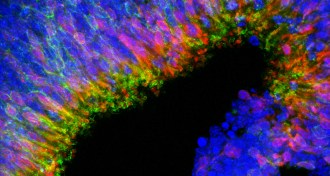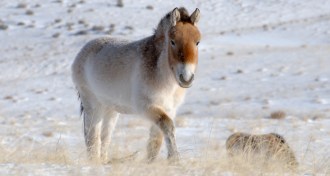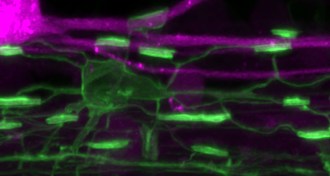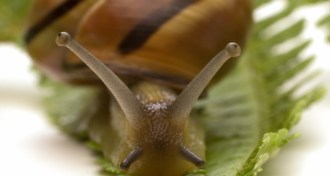
Senior writer Tina Hesman Saey is a geneticist-turned-science writer who covers all things microscopic and a few too big to be viewed under a microscope. She is an honors graduate of the University of Nebraska-Lincoln where she did research on tobacco plants and ethanol-producing bacteria. She spent a year as a Fulbright scholar at the Georg-August University in Göttingen, Germany, studying microbiology and traveling. Her work on how yeast turn on and off one gene earned her a Ph.D. in molecular genetics at Washington University in St. Louis. Tina then rounded out her degree collection with a master’s in science journalism from Boston University. She interned at the Dallas Morning News and Science News before returning to St. Louis to cover biotechnology, genetics and medical science for the St. Louis Post-Dispatch. After a seven year stint as a newspaper reporter, she returned to Science News. Her work has been honored by the National Academies of Sciences, Engineering and Medicine, the Endocrine Society, the Genetics Society of America and by journalism organizations.

Trustworthy journalism comes at a price.
Scientists and journalists share a core belief in questioning, observing and verifying to reach the truth. Science News reports on crucial research and discovery across science disciplines. We need your financial support to make it happen – every contribution makes a difference.
All Stories by Tina Hesman Saey
-

-
 Genetics
GeneticsTechnique inactivates Down-causing chromosome
Though far from a cure, the advance could eventually lead to gene therapy that alleviates some symptoms.
-
 Life
LifeGenetic test fingers viral, bacterial infections
If made to take less time, test could help doctors treat children's fevers.
-
 Genetics
GeneticsKiller whales are (at least) two species
Orca genetics highlights distinctions among groups that feed on different prey.
-
 Life
LifeGene therapy treats children with rare diseases
Six kids are healthy, up to three years after treatment.
-
 Life
LifeDeadly flu virus flourishes in lung cells
H7N9 influenza's clinging ability in humans and birds raises concerns about increased transmission between species.
-

-
 Life
LifeAncient horse’s DNA fills in picture of equine evolution
An entire genome compiled from a 700,000-year-old bone yields new information about equine history.
-
 Life
LifeBrain cell insulators are short-timers
Limited myelin production time may make it harder to repair nerve casings damaged by multiple sclerosis.
-
 Life
LifeOn the trail of a new virus
Map of MERS infection finds microbe spread through hospital dialysis units.
-
 Anthropology
AnthropologySnails trace Stone Age trek from Iberia to Ireland
A genetic quirk linking snails in two distant areas suggests people brought escargot on their migration to the Emerald Isle.
-
 Science & Society
Science & SocietyThe gene patenting decision from a plaintiff’s point of view
Plaintiffs in Myriad case win an overwhelming victory, but some details remain a bit fuzzy.